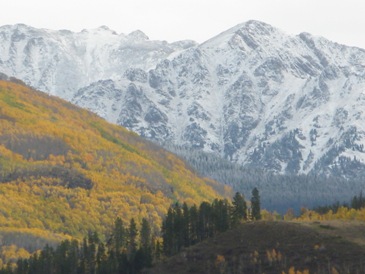Appeals court upholds Clinton roadless rule
The United States Tenth Circuit Court of Appeals today upheld the 2001 Roadless Area Conservation Rule passed by the Clinton administration for the management of more than 50 million acres of federal land across the United States designated as roadless areas. The Clinton rule limited road building on federal lands for industries such as mining, logging and oil and gas development, including more than 4 million acres in Colorado. The Bush administration set aside the Clinton rule, paving the way for more than a decade of litigation.
Jul 31, 202037.8K Shares1.2M Views
The United States Tenth Circuit Court of Appeals today upheld the 2001 Roadless Area Conservation Rule passed by the Clinton administration for the management of more than 50 million acres of federal land across the United States designated as roadless areas.
The Clinton rule limited road building on federal lands for industries such as mining, logging and oil and gas development, including more than 4 million acres in Colorado. The Bush administration set aside the Clinton rule, paving the way for more than a decade of litigation.
In 2008, a federal court in Wyoming found that the roadless rule violated federal environmental law. Today’s Court of Appeals decision overturns that 2008 ruling and opens the door for the Obama administration to enforce the Clinton rule.
In 2005, the Bush administration moved to a state-specific petition process that allowed individual states to draft their own roadless rules. Only Colorado and Idaho went that route, with then Colorado Gov. Bill Owens launching a six-year process that still has not been finalized.
Conservation groups have criticized the Colorado Roadless Rule for allowing too many exemptions for coal mining, logging and ski-area expansion.
“The decision clears the way for the Obama administration to fulfill its promise to enforce the roadless rule as the law of the land,” said Jane Danowitz, director of the Pew Environment Group’s U.S. public lands program. “It also allows the administration to reject a flawed Colorado plan to manage national forests there, developed as an ‘insurance policy’ when the national rule’s legal status was in doubt.”
Sportsmen’s groups have been working with Colorado officials and the U.S. Forest Service to make improvements to the Colorado rule, while simultaneously opposing recent legislation in the U.S. House called the Wilderness and Roadless Area Release Act (H.R. 1581) that would essentially invalidate the 2001 Clinton rule.
The Colorado rule also has divided the state’s congressional delegation, with freshman Republican Rep. Scott Tipton supporting more road buildingand senior Congresswoman Diana DeGette opposing the state ruleand attempts to undermine the 2001 Clinton rule.
The latest draft of the Colorado rulewas deemed a better try by some Colorado conservation groups but still a miss. Mike King, head of the state’s Department of Natural Resources, has long maintained that the Colorado rule is better than the legal limbo faced by the Clinton rule and that the state rule recognizes the new dynamic of the ongoing mountain pine bark beetle epidemicby allowing for better thinning of dead and dying forest around mountain communities.
In 2009, a federal appeals court upheld a lower court ruling in favor of the 2001 Clinton rule. At that time, the Wyoming federal court decision was still being appealed. Colorado elected to stay the course and continue drafting its own rule.
“In Colorado in 2001, we didn’t have a bark-beetle epidemic, and now we find ourselves eight years later with at least 2 million, and maybe more like 2.5 million, acres of dead trees,” King said at the time. “Many of these acres are adjacent to communities, and the risk of catastrophic wildfire has increased exponentially as a result.”
Now the pine beetle epidemic has claimed more than 4 million acres of lodgepole pines. But the Colorado rule also includes exemptions for coal mining along the North Fork of the Gunnison River, where companies need to build roads to vent methane from underground coal mines. Those exemptions drew criticism from the U.S. Environmental Protection Agency.
The Colorado Department of Natural Resources did not immediately provide a comment on today’s ruling.
Editor’s note: This story will be updated as more information becomes available.

Dexter Cooke
Reviewer
Dexter Cooke is an economist, marketing strategist, and orthopedic surgeon with over 20 years of experience crafting compelling narratives that resonate worldwide.
He holds a Journalism degree from Columbia University, an Economics background from Yale University, and a medical degree with a postdoctoral fellowship in orthopedic medicine from the Medical University of South Carolina.
Dexter’s insights into media, economics, and marketing shine through his prolific contributions to respected publications and advisory roles for influential organizations.
As an orthopedic surgeon specializing in minimally invasive knee replacement surgery and laparoscopic procedures, Dexter prioritizes patient care above all.
Outside his professional pursuits, Dexter enjoys collecting vintage watches, studying ancient civilizations, learning about astronomy, and participating in charity runs.
Latest Articles
Popular Articles
